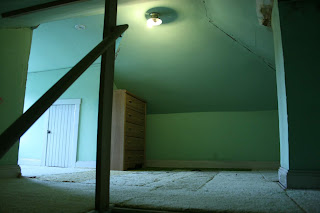I grew up on Hamburger Helper and On-Cor dinners with the occasional chicken and rice. I had the typical american diet of packaged foods and minimal vegetables. We weren't very well off, and for a time some of our food came from the church food pantry. My family loved our sweets. Ice cream, Little Debbies, and store-brand chocolate chip cookies filled our cabinets and freezer.
I was not off to the best start.
I believe my parents did their best to give us what they believed to be a well-rounded diet. The canned vegetables and applesauce are a testament to that. I was a picky eater, though.
I didn't know about whole grain bread or the existence of various fruits and vegetables until one time when my parents went away for a week and left my brother and I with a family friend. She stocked the kitchen with foods I'd never seen before, and I
liked them. At that point I decided that I would try anything at least once before deciding whether I liked it or not.
Working at McDonald's every night limited my options for dinner in high school. I almost always had a side salad with grilled chicken (believe it or not, you could probably still order that even though it's never been on the menu) and two "pies." My sweet tooth was (and is) still very prevalent.
In college, I lived off of Ramen soup and PB&J.
When I got married, I decided that I would only make our dinners from scratch and that we'd have a salad for dinner at least once a week. I started going through my Pinterest food board that had filled up over four years with hundreds of recipes.
Planner that I am, I laid out every single meal in an excel spreadsheet covering the entire year. I based my grocery lists off of the spreadsheet and continued working through the recipes. I decided to cook three night a week since most recipes were 6 servings (4 for our family, hubby has a big appetite), and we eat dinner with his family every Monday night.
I quickly realized that I was wasting a lot of food. I found recipes that used a portion of what I could get from the store, and I had no idea what to do with the remnants. I also realized that I wouldn't be able to keep it up when we started having kids.
I watched a number of documentaries on Netflix (believe me, there are a TON) on our diet. I'll probably list them in a future post. Two stuck out:
Fed Up was the first one I saw and it talked about the unhealthy amounts of sugar we consume, and
Forks Over Knives discussed a plant-based diet based off
The China Study.


Another documentary discussed the food industry's impact on farmers and how it exploits illegal immigrants (the only people willing to work for such low wages).
I realized that my diet can have a negative or positive impact on the environment and the people working to bring me my food. I decided to stop buying meat mostly to save money but also to force us to eat more vegetables. We still eat meat when it's served to us at our parents' homes or when we're out. I also chose to try to buy with the seasons, getting organic produce based off the dirty dozen list and buying frozen vegetables and fruit in off seasons.
I'm currently working on simplifying my meal plan. I'm starting to put meals on rotation rather than trying something new every night. I've made a broad theme for each night I cook to narrow down ideas and keep it interesting. (If you're wondering: Tuesday is Latin American, Thursday is Western European, and Saturday is Asian) I'm also looking at the ingredients and trying to have some overlap within the week. I'll probably explain my food choices more in-depth in a future post.
I still need to work on cutting out added sugars and wasting less. Since I started a vegetable garden, I started composting this year - that helps.
I have more energy (which those who know me know is a big deal), I don't really want meat much anymore, and I lost all the baby weight by eight months postpartum. It's also easier to feed the baby people food when I can grab almost anything from the cupboard and give it to him. I don't know if this is a permanent change, but I'm happy with it now.



















